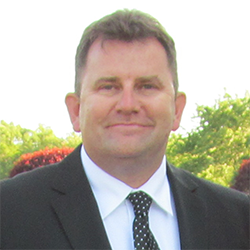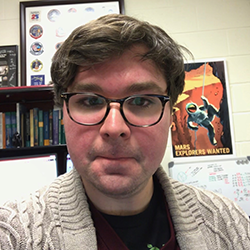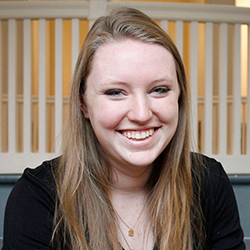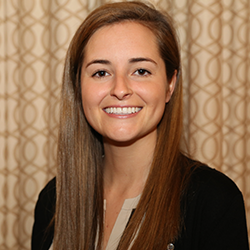Session 1: Space Science
Moderator

Michael Roberts, Deputy Chief Scientist, International Space Station U.S. National Laboratory
Michael Roberts is deputy chief scientist of the ISS U.S. National Lab where he works to imagine and enable science in space for life on Earth. Roberts has been with the ISS U.S. National Lab since 2012 and has been a space researcher since 1999, working as a microbial ecologist, molecular biologist and principal investigator for ground-based research in the NASA Advanced Life Support program at the Kennedy Space Center and flight research on the shuttle and the International Space Station.
Panelists

Rafael Loureiro, Assistant Professor, Botany, Winston-Salem State University (2018–19 NC Space Grant New Investigator Award Recipient)
Rafael Loureiro is a botany professor at Winston-Salem State University. His works focuses specifically in the analysis of plant ecophysiological responses applied to human space exploration-based horticulture and worldwide food security. He also designs prediction models that evaluate the co-evolution of pigments and exoplanetary development stages. Loureiro has collaborative work with NASA Ames and NASA Kennedy Space Center, an is responsible for establishing a Space Act Agreement between Winston-Salem State University and NASA KSC VEGGIE program allowing students to be directly involved with cutting-edge space exploration research. Loureiro has a passion for scientific communication and science policy, and was chosen by the American Geophysical Union as one of America’s voices for science.

Kate Richardson, Undergraduate Student, Physics/Computer Science, University of North Carolina at Chapel Hill (2018–19 NC Space Grant / NC Museum of Natural Sciences Astrophysics Laboratory Intern)
Kate Richardson is a sophomore double majoring in physics and computer science. The summer of 2018, she was the NASA Space Grant intern under Rachel Smith at the Museum of Natural Sciences in Raleigh, N.C. The project consisted of adding data from recent NASA spacecraft missions such as Juno and Dawn to the data visualization software OpenSpace. She won a presentation award for her poster on this work at the Sigma Xi conference in October 2018. At UNC-CH, she researches axion dark matter with the ABRACADABRA experiment under advisor Reyco Henning. She went to Fairview High School in Boulder, C.O., where she did research on the ionosphere of Mars with David Brain at the Laboratory for Atmospheric and Space Physics at the University of Colorado.

Lindsay Sullivan, Ph.D. Student, Biomedical Engineering, UNC Chapel Hill (2018–19 NC Space Grant Graduate Research Fellow)
Lindsay Sullivan is a Ph.D. candidate in the joint department of biomedical engineering at the University of North Carolina at Chapel Hill and NC State University. Her research focuses on analyzing bone structure, material properties and function for various applications including spaceflight, radiation therapy and hemophilia. Sullivan received NC Space Grant support for her research in 2015 and 2018.